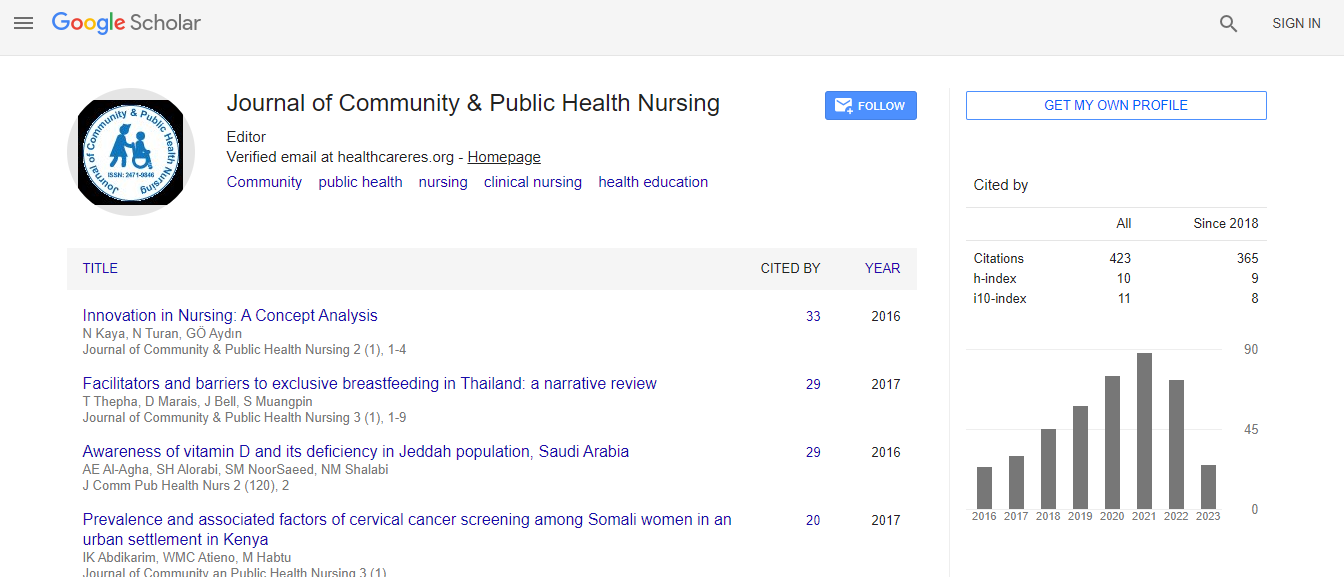Our Group organises 3000+ Global Conferenceseries Events every year across USA, Europe & Asia with support from 1000 more scientific Societies and Publishes 700+ Open Access Journals which contains over 50000 eminent personalities, reputed scientists as editorial board members.
Open Access Journals gaining more Readers and Citations
700 Journals and 15,000,000 Readers Each Journal is getting 25,000+ Readers
Google Scholar citation report
Citations : 739
Journal of Community & Public Health Nursing received 739 citations as per Google Scholar report
Journal of Community & Public Health Nursing peer review process verified at publons
Indexed In
- Google Scholar
- CiteFactor
- RefSeek
- Hamdard University
- EBSCO A-Z
- OCLC- WorldCat
- Publons
- Geneva Foundation for Medical Education and Research
- ICMJE
Useful Links
Recommended Journals
Related Subjects
Share This Page
Psychiatric patient satisfaction scores: Improving scores by reducing mental health stigmas of healthcare professionals
Joint Event on 21st World Congress on Registered Nurse and Nurse Practitioner Meeting & Nursing Education and Management
Ruth Ann Cangialosi
Footprints to Recovery, USA
Keynote: J Comm Pub Health Nursing
Abstract
Statement of the Problem: Negative attitudes and beliefs of healthcare professionals towards mental illness can negatively impact patient care delivery and patient outcomes. Current literature suggests that many health care professionals have stigmas towards mental health. The broad population affected by mental health disparities includes anyone who suffers from a mental illness, including anxiety, depression, and substance abuse. Methodology & Theoretical Orientation: A current gap in published literature exists in reducing disparities towards those with mental illness. The theoretical foundation of Peplau, Watson, and Barker, provided the foundational base that those with mental illness need to provide a patient-centered approach that is free of stigmas and bias. Quantitative methodology was utilized to observe, interpret and explain mental health stigmas among healthcare workers. A pre-test and post-test design using an established data collection tool discovered relationships between mental health stigmas and patient satisfaction scores. Findings: The results demonstrated that the participating healthcare providers did harbor stigmas towards mental health. Stigmas were determined from empirical literature to be detrimental to the care and outcomes for patients diagnosed with mental illness. Conclusion & Significance: It was concluded that mental health stigmas do exist with the mental health professionals and that these stigmas negatively impact patient care and outcomes. It was also concluded that these stigmas can be reduced through staff interventions. It was shown that mental health stigmas are global in nature and pose a threat to public health, societal health, and the individual health of people.Biography
Ruth Ann Cangialosi, DNP, MSN, RN-BC has her expertise and passion in psychiatric mental health nursing. Her servant leadership demonstrates her passion for the professional role of psychiatric nursing and her compassion for the mental health community. Her mission and philosophy of psychiatric nursing were built on years of caring for those with mental illness, her experience as an educator, and her clinical leadership in psychiatric hospitals from Arizona to Detroit. She bases her professional career on Barkers Tidal Model of Recovery. Her values of collective accountability advocacy, research, and leadership are welcomed in transformational leadership, higher reliability organizations, improving workflows and procedures while building partnerships with executives, physicians, nurses, unlicensed staff, external customers, stakeholders, and most importantly, the patients.
E-mail: dr.cangialosi@gmail.com

 Spanish
Spanish  Chinese
Chinese  Russian
Russian  German
German  French
French  Japanese
Japanese  Portuguese
Portuguese  Hindi
Hindi 
